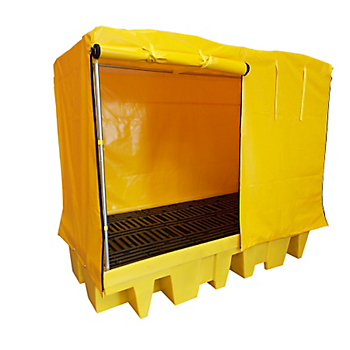
PIG® Essentials 8-Drum / 2-IBC Covered Containment Pallet
PAKE224
Write a Review
Holds (8) 210 ltr. Steel or Poly Drums, or (2) 1000 ltr. IBCs, 1140 L Sump Capacity, 2500 kg Load Capacity
As Low As £1,952.25 (Ex. VAT)
Load your drums or IBCs into this roomy Covered Pallet for all-weather protection and liquid containment.
Read More
PRICING (Based on quantity)
| 1 - 2 | 3 + |
|---|---|
|
1
- 2 £2,055.00 (Ex. VAT) |
3
+
£1,952.25 (Ex. VAT) Best Buy |
| Best Buy |

Description & Specifications
Load your drums or IBCs into this roomy Covered Pallet for all-weather protection and liquid containment.
- Ideal for the storage of chemicals, drum dispensing and hazardous waste collection
- Tall headspace easily accommodates drums or IBCs with rotary pump equipment and conical funnels still in place
- Pallet sump catches leaks, drips and spills while keeping drum or IBC tops and accessories within reach
- Self-assembly steel frame with PVC Cover prevents stormwater from entering and protects the drums or IBCs inside
- The opening flap of the cover has ties to hold it in place when 'rolled' up and open
| Dimensions | 256cm W x 135cm L x 221cm H |
| Load Capacity UDL | 2500 kg |
| Sump Capacity | 1140 L |
| Double-Stackable Unit | Not Double-Stackable |
| Drain | No Drain |
| Fork Truck Access | Two-Way Fork Access, Move Unloaded Only |
| Grates | (3) 120cm L x 80cm W Grates |
| Sold as | 1 each |
| Weight | 156 kg |
| # per Pallet | 3 |
| Composition |
Pallet & roof panel - Polyethylene; Cover - PVC; Frame - Galvanised Steel |
| Capacity | (8) 210 ltr. Steel or Poly Drums, or (2) 1000 ltr. IBCs |
Reviews
Based on 0 review(s)
Additional Information
-
The Control of Pollution (Oil Storage) Regulations (Northern Ireland) 2010
The Regulations apply to above ground oil storage facilities on industrial, commercial and institutional residential sites. They also extend to companies who refine or distribute oil. The Regulations set minimum design standards for new and existing above ground oil storage facilities, codifying existing good practice to ensure that above ground oil storage facilities are adequately constructed. A key requirement of the Regulations is for the storage container to have a secondary containment system (a bund, which is an outer wall or enclosure designed to contain the contents of an inner tank, or, a drip tray) to ensure that any leaking or spilt oil is contained and does not enter the aquatic environment. -
The Control of Pollution (Oil Storage)(England) Regulations 2001
This regulation applies to any container with a storage capacity of over 200 litres, and applies to any industrial, commercial or institutional site, e.g. factories, shops, offices, hotels, schools, public sector buildings and hospitals. All types of oil except waste oil are included. A bund or catchpit has to form a container around the tank capable of holding 110% of the contents of the oil stored or 25% of the total volume, whichever is greater. This is known as secondary containment. -
The Water Environment (Oil Storage) (Scotland) Regulations 2006
This regulation applies to any container with a storage capacity of over 200 litres. It affects all premises, including land and mobile plant, as well as private dwellings. "Oil" means any kind of oil and includes petrol, diesel, waste and vegetable and plant oil, but does not include bitumen. The storage container, whether indoors or outdoors, must be situated within a secondary containment system capable of holding 110% of the contents of the oil store or 25% of the total volume (whichever is greater). -
The Water Resources (Control of Pollution) (Oil Storage) (Wales) Regulations 2016
The Regulations apply to any kind of oil, including petrol, diesel, kerosene, lubricating oil (both mineral and synthetic), waste oil, vegetable and plant oil, and apply to any kind of container which has a capacity of greater than 200 litres which is being used to store oil above ground, whether inside or outside a building. This includes fixed tanks, intermediate bulk containers (IBCs), drums (oil drums or similar containers used for storing oil) or mobile bowsers. The Regulations will come into force in 3 stages - Tanks installed after 15 March 2016 will have to comply with the Regulations from the date they are installed; Existing tanks at significant risk (i.e. facilities that are located within 10 metres of any surface water or wetland, or 50 metres of a borehole or well), will have to comply within 2 years (i.e. by 15 March 2018); Existing tanks not at significant risk will have to comply within 4 years (i.e. by 15 March 2020). The secondary containment system must contain at least 110% of the maximum contents of the oil container, or at least 25% of the total storage capacity if multiple containers are stored, whichever is the greater.
Disclaimers
Flammables Notice
If using this product with flammable liquids, please consider the regulations that apply to storage and handling of flammable liquids and the safety of this application, specifically flammable vapours, static discharge and heat sources. For further assistance, please call Technical Services.












